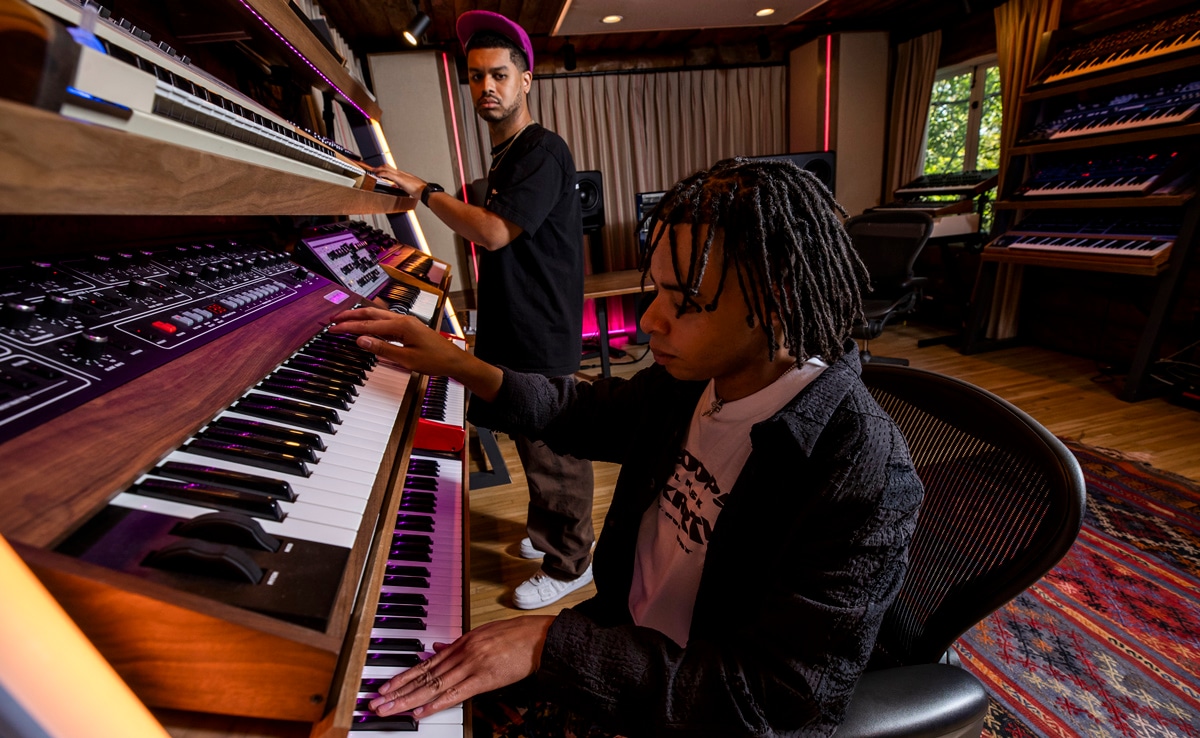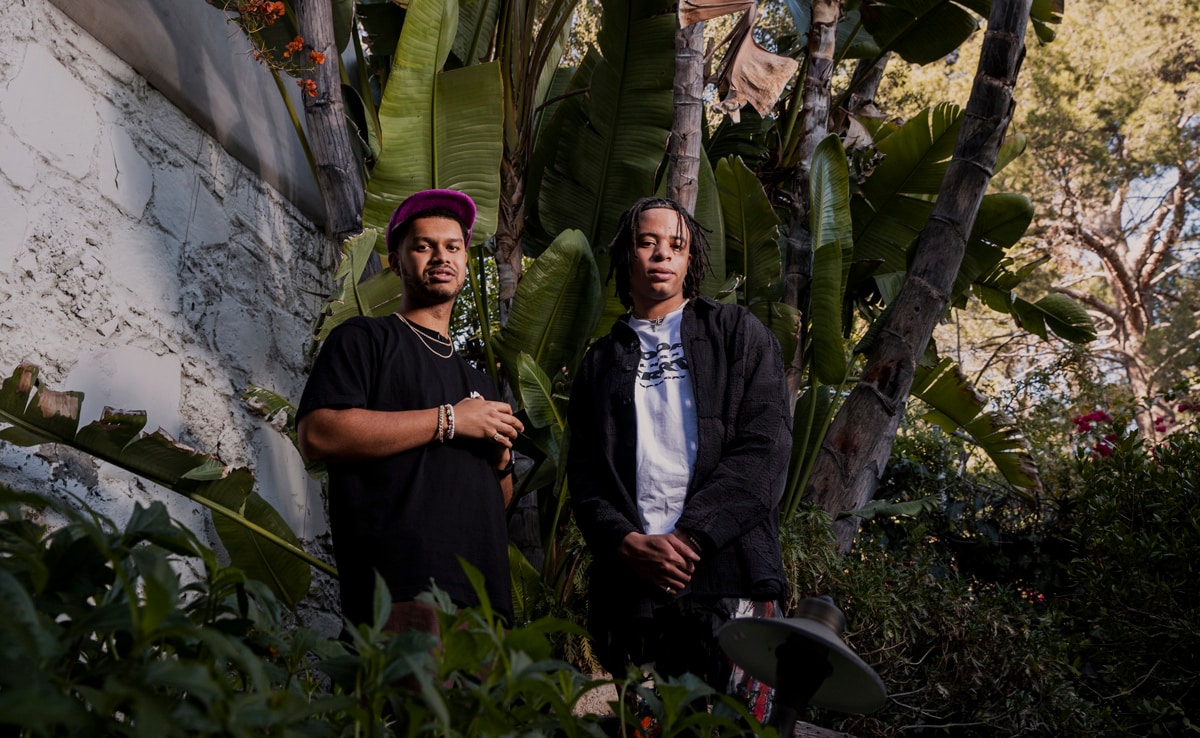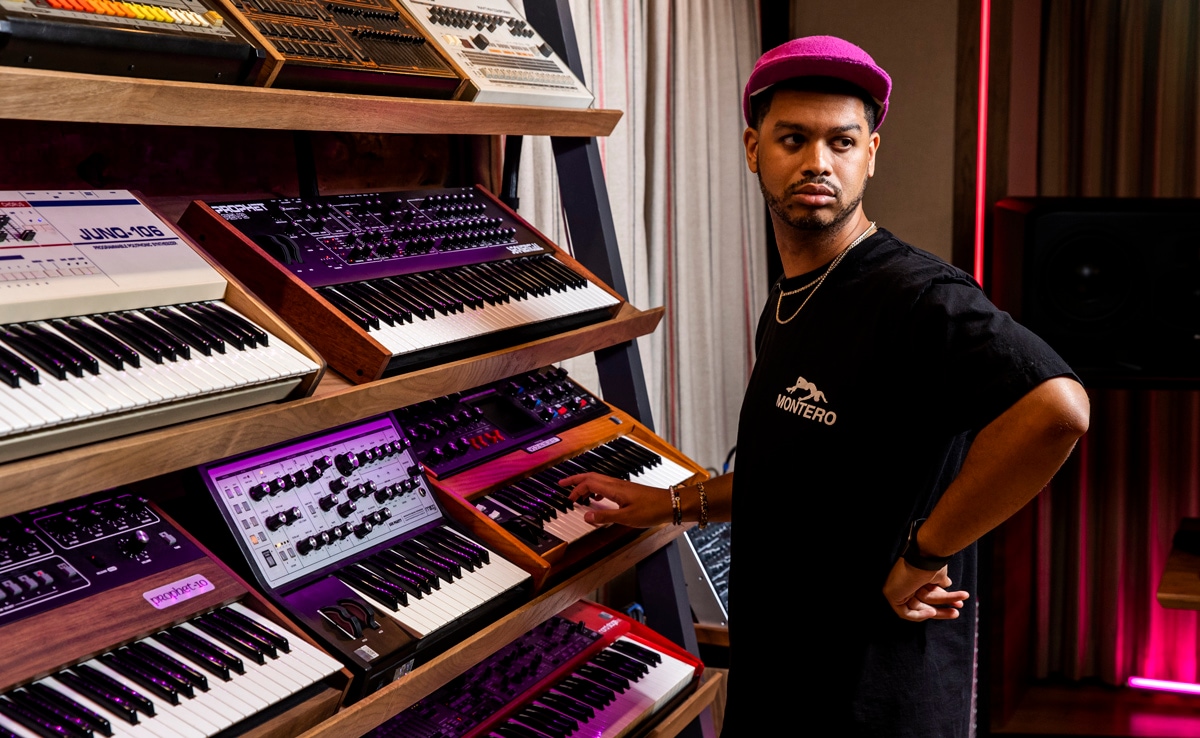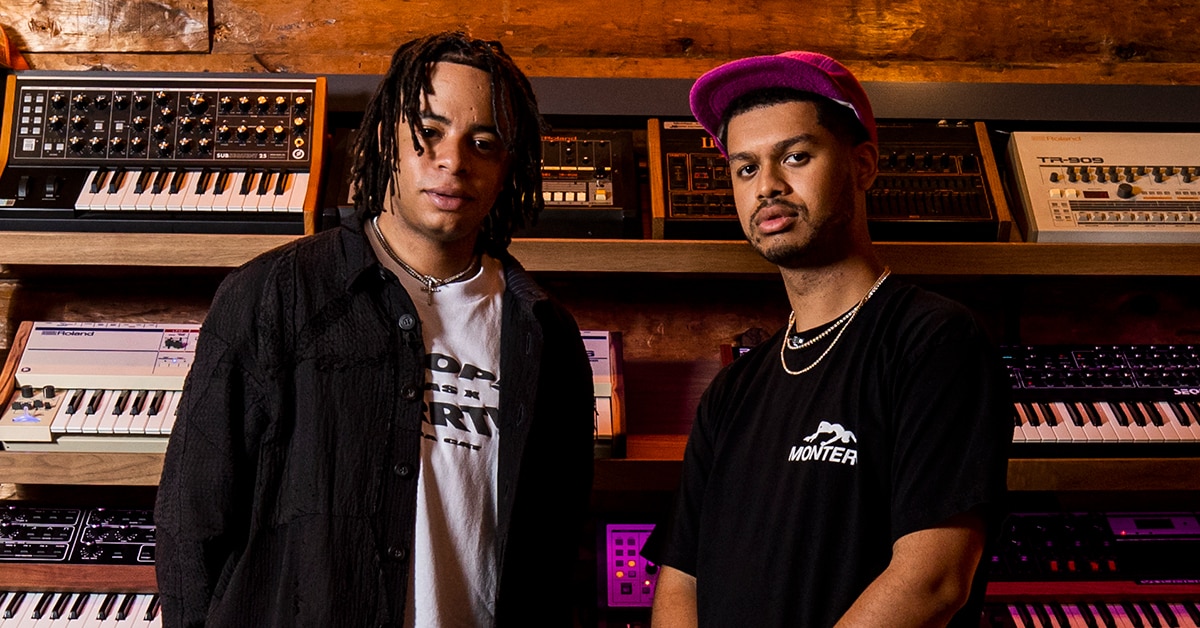Take A Daytrip may be based in Los Angeles, but their music is a journey around the world, with each track pulling inspiration from the sounds and beats of a different city. Their mutual passion for music theory and a deep understanding of international music trends have turned the production and songwriting duo into certified hit makers, working with artists from a variety of backgrounds, from rap to rock and everything in between. Through a shared desire to make the world feel smaller through music, Denzel Baptiste and David Biral have sparked a friendship that fuels their creation process. Find out about their mutual passion for collecting analog synthesizers, how they approach collaborating, and what it’s been like to create a genre-spanning reputation by producing hits like “Hero” by Weezer and Lil Nas X’s debut album MONTERO.
David Biral: We met at the Clive Davis Institute of Recorded Music at NYU back in 2011. Our sophomore year, we went to Miami during the Ultra Music Festival for spring break and that was the first time we were like, “We should actually do something official together.”
Denzel Baptiste: We both came from small towns, and suddenly we're in New York City. We both connected on wanting to do everything—sneaking in clubs and going to Brooklyn and trying to sneak into studios. We were like, “All right, we could just sit in the dorm and hang out but, what if we didn’t?” We started taking trips to different places. Miami, then Boston. We were just trying to go everywhere. But the thing we noticed when we went to Miami was that the music we were making there was different from what we were doing in New York. Then when we went to Boston, the music we did there was different from those other two places. It was interesting to see how the place informed the music we were making.
Biral: Yeah, part of our reason for naming ourselves Take A Daytrip was we wanted to have a constant reminder that our biggest goal in life is to see the world through music. As we've been continuing forward, it's become more about our lifelong mission to make the world feel smaller through music. Take A Daytrip was just us sticking to one vision and being like, “Let's do this together.”
How would you describe the Daytrip sound?
Biral: The Daytrip sound and the music we make is rooted in hip-hop. Both of us had very similar interests in music but I think in our last couple years of high school, both of us got really inspired by different genres.
Baptiste: We both grew up with hip-hop being a huge part of our lives but with David learning classical first and me learning gospel first. Then we get to college and discover Justice, which is this French duo that's basically gospel and classical put together. We're just like, “Whoa. This is crazy.” Then that became our obsession. One of the groups that probably inspired us the most because of the way both of those genres are so good at extracting emotion out of people. It's hard to hear a beautiful gospel song or classical song and not feel moved.
Baptiste: I think where our music bends outside of hip-hop is when we want to create specific emotions. A lot of times, we're starting a song and it's genre-less. It's just music and may only be a piano loop or a guitar loop. Then we’ll think about what kind of emotion this type of music can create.
Biral: On top of that, everything is very analog based. There’s a mutual passion for collecting gear, trying new gear out, and figuring out our own ways to approach each instrument. We have a bunch of go-to sounds that we've discovered and honed in on with each of the keyboards we've collected.
Grunge is another genre that we love because it borrows so much from classical music in terms of how each song is structured. You have Nirvana records where the vocals are in major and the rest of the chord progression is in minor. Just realizing you can break rules and it still sounds cool. I think for us, whenever we're creating, we all just come to an agreement on what we think sounds the coolest to us. And that's the path we always like to go down.
Being a production duo is a fairly unique. What’s it like working and creating together simultaneously?
Biral: We've known each other for ten years. We've learned from each other in the process, and we’ve also had a lot of resources in front of us. We were lucky enough to meet our friend, Mel DeBarge who had a studio in SoHo we pretty much grew up in. He’d collected a bunch of vintage synths, and it was our first opportunity to create with each other where we weren’t passing one laptop back and forth. And like, “Oh, my idea's done. Here you go. Okay.” It allowed us to get on two separate keyboards and jam for the first time.
Both of us are able to play on a wide array of different keyboards at the same time and come up with ideas from scratch that can have a bass part, a lead line, some chords, just off of us jamming one take. It's very free-flowing and fun and we like to keep our keyboards recording at the same time so we're able to come up with ideas together.
Baptiste: At some point it becomes a hive mind type of thing where we're sharing so many ideas back and forth, it's like our ideas become one. That's the way we create—taking out the ego and saying whatever I think is a good idea, I'm going to write it down. Then you put down an idea. I don’t even care where the idea comes from. If an idea is cool, we're going to keep it. It's not really a matter of roles at this point. We have two mice for the computer too. Two computer keyboards. So, at any point, we could do anything.
Biral: The best idea wins. When we discovered taking ego out of our process, it was the best thing to making the best music. We just haven't looked back from that moment.
Baptiste: It makes it easier for other people to collaborate with us because it's like, I don’t even care where an idea comes from. Nas could play the keyboard and if his idea is cool, we're going to keep it. It’s not really a matter of roles.

What has your approach been to collecting gear?
Biral: It's been a long journey for us, collecting gear. At the beginning, it was our friend Mel who had so much gear and we were able to dive into it for the first time and really start to understand the difference between certain instruments. From that point, we looked at Moog instruments as the core of a lot of our bass sounds. We looked at things from Dave Smith as very versatile but, in most instances, we're collecting those for lead sounds and chords. Those two companies were our first entryway into collecting gear and that's how we started to look at collecting synths and analog gear moving forward. We like to figure out what each gear is specifically best at and then how it would work best within our process.
Baptiste: Our entire thought process behind having gear is to get to things faster, and for it to be more of a fun process than a cognitive process. Then it's all just intuition. Turn on this keyboard. This is the sound I want to get. This one does this. If I want this, I'm going to go walk over in this direction. It really frees up our mind to be creative.
Did that philosophy also dictate how you organize your studio?
Baptiste: We arranged our space in a way that invites collaboration. Sometimes, we'll step into a studio where a producer is working by themselves and it's a completely different thought process of how to build a room. Because, for us, it's always been the two of us.
Biral: Even the way we arrange our keyboards. Our Sub Phatty and our Voyager are in the middle of synths that are mainly for chords and lead sounds. It allows us to sometimes play one instrument and then, on the bass, we're able to play with another hand. Like the Moog One is capable of doing a lot of different things, but if we're just using it for bass sounds, we have the OB-6 right on top of it for leads and chords. That allows for more flexibility to expand on an idea. That’s also how we think about arranging our studio. Sometimes we switch things around to get different combinations.
When we're traveling outside of the studio and prepping for someone like a Kid Cudi, we bring our OB-6. We bring our Prophet 6. We bring either the Sub Fatty or the Voyager for bass, and we kind of have the sound palette we want to create for that day and the instruments that we think are capable of achieving those sounds. From there, it's just doing what we always do. It's creating without ego and being free within that.

What is the power of a great beat? How do you know when you’ve got one?
Baptiste: It's how you move to it. Sometimes you hear a song and your body just starts reacting. We learned that with "Mo Bamba" because the first few times we played it in different venues, it got the same reaction. We were like, “All right, we played it here and people jumped off a table. We played it here and people jumped off a table.” When we were in the studio, we were doing the same thing. We were jumping around and going crazy.
Biral: With "Mo Bamba," that chord progression literally is just tension. That tension is building the whole time and never actually resolves. So, the whole time, you're going in this loop of “All right, I just want to rage. I just want to party.” Those are the types of things we're always thinking about. How does this make people feel, how are they going to respond to this?
You name all of your beats after food. How did that start and what are some examples?
Baptiste: We named all of our beats after food primarily as a joke. Our manager was always like, “You guys got to make beats.” So eventually, we said, “We'll make some beats. We'll cook up a little Daytrip cookbook. Only do a few of them.” Then we were looking up different meals and that inspired us by thinking about what region or country each beat might be from. Say it's an Afrobeat. We'll look up the best Nigerian food, which kind of works in our favor because when we send that Afrobeat to a Nigerian artist, they're like, “What do you know about this?” And we're like, “You know, a lot.”
It's a funny thing that we kept but it makes it easy to remember which beat is which. What was the “Panini” beat from 2018? Oh, it was “Beef Pasta” because we ate beef pasta that day with Dot. Which one was “The Scotts?” That was “Pizza,” because we had pizza and we were like, “This beat's terrible. Let's just have pizza instead and not even finish working on it.” And we finished it and it became "The Scotts."
Biral: Or the tequila shots with Kid Cudi, that beat was called "Tequila Shots." A lot of our beats are named after what we were actually eating or having at the moment. "Tequila Shots" was special because it was our first time all together celebrating "The Scotts" going to #1. We had a nice bottle of Don Julio 1942, cheers'd it up, took the shot, named the beat "Tequila Shots" and the song became "Tequila Shots." Better than naming your beat 1, 2, 3, A, B, wave file whatever.

What was it like working on MONTERO with Lil Nas X?
Baptiste: Working on MONTERO was the biggest task of our lives up to this point.
Biral: And in the middle of the pandemic.
Baptiste: We happened to be Nas's first session and the first session that we do becomes a hit. One of our biggest hits. His follow-up hit to “Old Town Road” that really solidified him as an artist. That was "Panini." It definitely wasn't a constant slope of progression though. There were so many ups and downs. Even points where I'm sure his label was like, “Can they even do this?” We were going months without doing one song. Just a ton of ideas we couldn’t really get to gel in any way. We were getting on conference calls and group calls with the label, and they're like, “All right, so you guys are supposed to deliver us an album but we don’t have any songs.” And we're like, “Yeah, but they're going to come. Just trust us. Wait. They'll come.”
Biral: The process that we ended up using for the album was a process that allowed everyone to feel stress-free. I think that's when all of us were really like, “This is the way to do it.” We've also learned patience in a different way. "Call Me By Your Name" is a song that took months to make, for example. Like, six to eight months from the day it was created to the very last day. Pretty much every song on the album took a long time to make, and that was new for every single person who was a part of the process. It was a lot of revisiting records, having ideas, changing things up, switching out the 808s at the last minute sometimes.
At the base of it all, we developed a level of trust where, if we're executive producing your project, we're not just your producers but we're your brothers. We're your family. We're your best friends. We're here to make sure that your life and your career for the rest of your life is what you want it to be. And Nas also felt the same way for us. Once we locked in with the type of music we wanted to create and the type of message we wanted to put out to the world, that's when things really started making sense.
How has working with Lil Nas X and going through that journey together influenced you as artists?
Biral: I think the greatest art is art that's changed our lives. Art that makes you discover something different and forces you to challenge your own opinions about things. And one of the greatest things about working with Nas is he's just so fearless. You could throw a pack of knives at him and he's going to dodge every single one. Seeing how he's maneuvered within this current world and being by his side every step of the way, creating exactly what he wants to make and see his vision through all the way to the end, it’s been life-changing. It's been a dream come true. I'm just so proud of Nas and what he's given to the world and what he will continue to give to the world.
Baptiste: I think the thing that keeps people apart is fear. The theory is that you can reduce every emotion to fear and love, and the reason that people don’t come together is really just based in fear. When creating with Nas, an openly gay rapper, his intention is to approach the creation process without any fear. Approaching it with love and saying, “This is what I want to express in myself. These are the fears that I've had and I want to break those fears down.” Then people see Nas perform "Call Me By Your Name" on the BET Awards and they’re like, “You know what, I respect it. I understand it a lot more now.”
You’ve worked in many different types of music including hip-hop, rock and synth pop. How do you approach creating within these various genres?
Baptiste: Working with different artists has a lot to do with the fact that we’ve DJ'ed a lot and spent a lot of time in different countries. And we love listening to music in general, so at a certain point, no matter who comes in, there will be an intersection of them loving something and us loving it too. Just a mutual respect for different types of music.
Biral: We don't just study the music, we study everything around the music. Like how people dance to music around the world. Using the UK as an example, most of the music that they grew up on—garage music, different types of grime music—a lot of them nod on the beats backwards. If we're going to make something for the UK, they need to bounce and bob their head like this, whereas in the United States, we're used to down beats. The same thing goes for if we're making Afrobeats, West Coast music, Latin music, things that live within the same tempo but drums are put in certain places to create different dance moves. Like, even the way we made "Scoop" on Lil Nas X's album, we made that thinking about TikTok and thinking about how people are going to dance to that 808 pattern. That’s another way we've thought about creating within different genres, by studying what happens around that style of music and the places that music is popular. We see how people interact with it and think about how we would build those type of moments from the ground up ourselves.

You share a lot of educational videos deconstructing your process. What motivates you to do this?
Baptiste: I would say that the best ideas should be open-source. If you truly have a vision, holding that idea hostage is the antithesis of that because then you don’t allow another person to iterate on it. You don’t allow another person to expand on it. Our goal is to make the world feel smaller through music. A part of that is putting these ideas out and sharing different things we learn, different tips that we pick up along the way.
Biral: The most important thing about us sharing our process is showing the world that this is possible and that it's something anyone can do if they put their mind to it. Even to go a step further than that, our biggest goal is to show people of color that they can achieve anything they want, especially in this creative field.
Keep up with Take A Daytrip.
"Music creates community by bringing people together from different backgrounds, different ways of life and making everyone feel like they belong in a space together."




